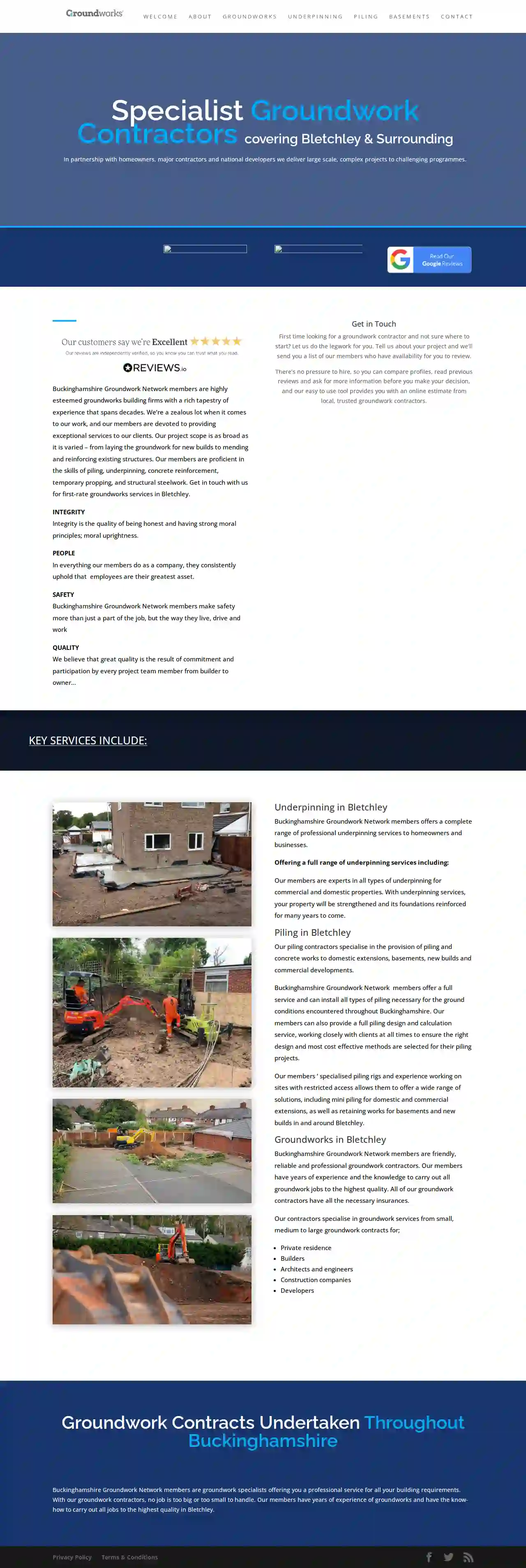Excavation Contractors Shenley Church End
Find Excavation Company Near Me in Shenley Church End
Get up to 3 Excavation Contractors Near Me quotes for your project today! Compare profiles, reviews, accreditations, portfolio, etc... and choose the best offer.

Elmtree Enterprises Ltd
4.737 reviewsBletchley, GBA warm welcome With over 21 years of experience, our family-run business takes pride in adopting a personalized approach to every project we undertake. We specialize in creating exceptional opportunities in rural locations, ensuring that each endeavour is unique and tailored to our clients' needs. Our construction services extend to a 2.5-hour radius, covering areas such as London, Oxford, Luton, Cambridge, Northampton, Coventry, Birmingham, Leicester, Derby, Nottingham, Warwickshire, Essex, Hertfordshire, Worcestershire, and Peterborough. At Elmtree Construction, we prioritize the implementation of renewable energy solutions across all our construction and equestrian projects. Sustainability and environmental consciousness are fundamental aspects of our work.
- Services
- Why Us?
- Gallery
Get Quote
Charles Bracken Ground Works Ltd
31 reviewsBletchley, GBSpecialist Groundwork Contractors covering Bletchley & Surrounding In partnership with homeowners, major contractors and national developers we deliver large scale, complex projects to challenging programmes. Buckinghamshire Groundwork Network members are highly esteemed groundworks building firms with a rich tapestry of experience that spans decades. We’re a zealous lot when it comes to our work, and our members are devoted to providing exceptional services to our clients. Our project scope is as broad as it is varied – from laying the groundwork for new builds to mending and reinforcing existing structures. Our members are proficient in the skills of piling, underpinning, concrete reinforcement, temporary propping, and structural steelwork. Get in touch with us for first-rate groundworks services in Bletchley. Our Values INTEGRITY Integrity is the quality of being honest and having strong moral principles; moral uprightness. PEOPLE In everything our members do as a company, they consistently uphold that employees are their greatest asset. SAFETY Buckinghamshire Groundwork Network members make safety more than just a part of the job, but the way they live, drive and work QUALITY We believe that great quality is the result of commitment and participation by every project team member from builder to owner… Get in Touch First time looking for a groundwork contractor and not sure where to start? Let us do the legwork for you. Tell us about your project and we’ll send you a list of our members who have availability for you to review. There’s no pressure to hire, so you can compare profiles, read previous reviews and ask for more information before you make your decision, and our easy to use tool provides you with an online estimate from local, trusted groundwork contractors.
- Services
- Why Us?
- Gallery
Get Quote- CE
CEMEX Bletchley Asphalt Plant
436 reviewsBletchley, GB- Services
- Why Us?
Get Quote - Co
Complex Builders
36 reviewsBletchley, GB- Services
- Why Us?
Get Quote - Eu
Eugen Phoenix Solution Ltd
52 reviewsBletchley, GB- Services
- Why Us?
Get Quote - TR
TREX SAFE
Bletchley, GB- Services
- Why Us?
Get Quote - Ba
Baxley Construction and Landscaping
Bletchley, GB- Services
- Why Us?
Get Quote
Over 13,059+ Excavation Companies registered
Our excavation contractors operate in Shenley Church End and surrounding areas!
ExcavationHQ has curated and vetted the Best Excavation Businesses in Shenley Church End. Find the most reliable business today.
Frequently Asked Questions About Excavation Contractors
- Excavators: Versatile machines with a bucket, arm, and rotating cab for digging, lifting, and moving earth.
- Backhoes: Similar to excavators but with a digging bucket on the back and a loader bucket on the front, ideal for trenching and smaller excavations.
- Bulldozers: Powerful machines with a large blade for pushing earth, clearing land, and leveling surfaces.
- Skid Steers: Compact and maneuverable loaders with various attachments (buckets, forks) for digging, loading, and grading in tight spaces.
- Trenchers: Specialized machines for digging narrow trenches for utilities.
- Dump Trucks: Vehicles for hauling excavated material to disposal sites.
- Project Size and Scope: Larger, more complex excavations naturally take longer.
- Soil Conditions: Rocky or challenging soil types can slow down progress.
- Site Accessibility: Limited access might require more time for maneuvering equipment and hauling materials.
- Weather: Inclement weather can cause delays.
- Permitting and Inspections: Waiting for permits or inspections can extend the timeline.
- Excavations Deeper Than a Certain Depth: This varies by jurisdiction, usually around 5 feet.
- Excavations Near Utilities: Digging near buried utilities (gas, water, electric) often requires permits and utility locates to prevent damage.
- Excavations Affecting Public Property: Projects impacting sidewalks, roads, or other public areas typically require permits.
- Excavations in Environmentally Sensitive Areas: Projects in wetlands, floodplains, or other sensitive areas might need special permits.
- Project Size and Scope: The larger and more complex the excavation, the higher the cost.
- Soil Type: Different soil types require different equipment and techniques, impacting costs. Rocky or clay-rich soil can be more expensive to excavate than loose soil.
- Accessibility: Difficult-to-access sites might require specialized equipment or additional labor, increasing expenses.
- Disposal Costs: Hauling away excavated material (soil, rocks, etc.) to disposal sites incurs additional fees.
- Permits and Inspections: Depending on local regulations, permits and inspections might be required, adding to the overall cost.
What equipment is used for excavation?
How long does an excavation project take?
Do I need a permit for excavation?
How much does excavation cost?
What equipment is used for excavation?
- Excavators: Versatile machines with a bucket, arm, and rotating cab for digging, lifting, and moving earth.
- Backhoes: Similar to excavators but with a digging bucket on the back and a loader bucket on the front, ideal for trenching and smaller excavations.
- Bulldozers: Powerful machines with a large blade for pushing earth, clearing land, and leveling surfaces.
- Skid Steers: Compact and maneuverable loaders with various attachments (buckets, forks) for digging, loading, and grading in tight spaces.
- Trenchers: Specialized machines for digging narrow trenches for utilities.
- Dump Trucks: Vehicles for hauling excavated material to disposal sites.
How long does an excavation project take?
- Project Size and Scope: Larger, more complex excavations naturally take longer.
- Soil Conditions: Rocky or challenging soil types can slow down progress.
- Site Accessibility: Limited access might require more time for maneuvering equipment and hauling materials.
- Weather: Inclement weather can cause delays.
- Permitting and Inspections: Waiting for permits or inspections can extend the timeline.
Do I need a permit for excavation?
- Excavations Deeper Than a Certain Depth: This varies by jurisdiction, usually around 5 feet.
- Excavations Near Utilities: Digging near buried utilities (gas, water, electric) often requires permits and utility locates to prevent damage.
- Excavations Affecting Public Property: Projects impacting sidewalks, roads, or other public areas typically require permits.
- Excavations in Environmentally Sensitive Areas: Projects in wetlands, floodplains, or other sensitive areas might need special permits.
How much does excavation cost?
- Project Size and Scope: The larger and more complex the excavation, the higher the cost.
- Soil Type: Different soil types require different equipment and techniques, impacting costs. Rocky or clay-rich soil can be more expensive to excavate than loose soil.
- Accessibility: Difficult-to-access sites might require specialized equipment or additional labor, increasing expenses.
- Disposal Costs: Hauling away excavated material (soil, rocks, etc.) to disposal sites incurs additional fees.
- Permits and Inspections: Depending on local regulations, permits and inspections might be required, adding to the overall cost.